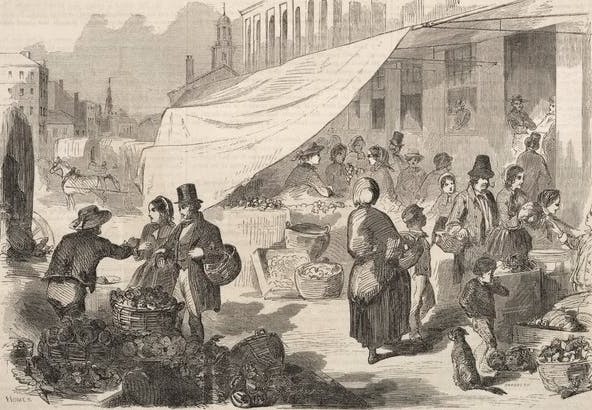Poem of the Day: ‘Soliloquy on an Empty Purse’
The English poet Mary Jones, passing her days as Oxford’s postmistress, appears in literary history as a minor, wryly comic spinster character.

The life of the English poet Mary Jones (1707–1778) was modest, spent almost entirely at Oxford, her birthplace. Making her home with her brother Oliver, a precentor and chaplain at Christ Church, and passing her days as Oxford’s postmistress, she appears in literary history as a minor, wryly comic spinster character. That she appears in literary history at all is chiefly due to the efforts and attention of her more glamorous acquaintances. Samuel Johnson, who encountered her on visits to Oxford, called her “the Chantress,” while other friends, overriding her own apparent lack of ambition, both urged her to publish and had her poems published behind her back.
Today’s Poem of the Day, bouncing along, chin up, in rhyming tetrameter couplets, shows us Jones in her self-deprecating comic mode. Her speaker sings of her beloved “silken Purse,” so full of grand hopes and clinking coins in the first heady days of her acquaintance with it. But “gold had wings and flew away,” abandoning the purse and leaving its versifying owner to a soberer life of virtuous self-denial. Their ultimate hope: a poverty-stricken attic, where the purse may genteelly molder away, while the poet, having risen above the malodorous breath of worldly flattery, engages herself in the higher calling of “gently rhyming rats to death.”
Soliloquy on an Empty Purse
by Mary Jones
Alas, my Purse! how lean and low!
My silken Purse! what art thou now!
One I beheld — but stocks will fall —
When both thy ends had wherewithal.
When I within thy slender fence
My fortune placed, and confidence;
A poet’s fortune!—not immense:
Yet, mixed with keys, and coins among,
Chinked to the melody of song.
Canst thou forget, when, high in air,
I saw thee fluttering at a fair?
And took thee, destined to be sold,
My lawful Purse, to have and hold?
Yet used so oft to disembogue,
No prudence could thy fate prorogue.
Like wax thy silver melted down,
Touch but the brass, and lo! ’twas gone:
And gold would never with thee stay,
For gold had wings, and flew away.
Alas, my Purse! yet still be proud,
For see the Virtues round thee crowd!
See, in the room of paltry wealth,
Calm Temperance rise, the nurse of health;
And Self-Denial, slim and spare,
And Fortitude, with look severe;
And Abstinence, to leanness prone,
And Patience, worn to skin and bone:
Prudence and Foresight on thee wait,
And Poverty lies here in state!
Hopeless her spirits to recruit,
For every Virtue is a mute.
Well then, my Purse, thy Sabbaths keep;
Now thou art empty, I shall sleep.
No silver sounds shall thee molest,
Nor golden dreams disturb my breast.
Safe shall I walk with thee along,
Amidst temptations thick and strong;
Catched by the eye, no more shall stop
At Wildey’s toys, or Pinchbeck’s shop;
Nor cheapening Payne’s ungodly books,
Be drawn aside by pastry-cooks:
But fearless now we both may go
Where Ludgate’s mercers bow so low;
Beholding all with equal eye,
Nor moved at — “Madam, what d’ye buy?”
Away, far hence each worldly care!
Nor dun nor pick-purse shalt thou fear,
Nor flatterer base annoy my ear.
Snug shalt thou travel through the mob,
For who a poet’s purse will rob?
And softly sweet, in garret high
Will I thy virtues magnify;
Outsoaring flatterers’ stinking breath,
And gently rhyming rats to death.
___________________________________________
With “Poem of the Day,” The New York Sun offers a daily portion of verse selected by Joseph Bottum with the help of the North Carolina poet Sally Thomas, the Sun’s associate poetry editor. Tied to the day, or the season, or just individual taste, the poems will be typically drawn from the lesser-known portion of the history of English verse. In the coming months we will be reaching out to contemporary poets for examples of current, primarily formalist work, to show that poetry can still serve as a delight to the ear, an instruction to the mind, and a tonic for the soul.
